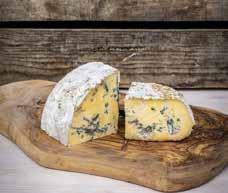
3 minute read
Did You Know?
Cheese the day!
If you needed an excuse to eat cheese, June 4th marks National Cheese Day. We’ve teamed up with award-winning cheese makers, Kingcott Dairy in Staplehurst (kingcottdairy.co.uk), to bring you these interesting facts to nibble on, plus a great competition…
Advertisement
1. A 2005 study from the British Cheese Board found that eating cheese 30 minutes before bed actually improves sleep, contrary to the popular belief that it gives you nightmares. Cheese contains an amino acid called tryptophan which promotes peaceful sleep. 2. Queen Victoria was given a giant Cheddar wheel that weighed over 1,000 pounds as a wedding gift. 3. People who love cheese are called turophiles. 4. Chilled cheeses should be taken out of the refrigerator one and a half to two hours before serving, the flavour will be at its best when the cheese is at room temperature 5. Cheese production around the globe is more than the combined worldwide production of coffee, tobacco, tea and cocoa beans. 6. During the Roman Empire large Roman houses had separate kitchens for manufacturing cheese only, they were called Careale. 7. During the Great Fire of London, Samuel Peyps buried his favourite cheese, Parmesan, in his back garden. 8. Cheese can be produced using a variety of milk, including coconut, soybean, nuts, cow, buffalo, goat, donkey, horse and camel!
WIN a Blue Cheese Box (550g), worth £22!
WIN
Kingcott Dairy’s Blue Cheese Box includes two different handmade blue cheeses, Kentish Crackers and a jar of sweet quince jelly. For the chance to win, email your answer to hello@ lifeinmagazines.co.uk with the subject line ‘Cheese competition’ to the following question:
Which one of these cheeses is not a blue cheese?
A. Kingcott Blue B. Gorgonzola C. Brie
Full T&Cs can be viewed online at https://bit.ly/lifeincomps
£20 & £50 notes to be replaced
The Bank of England will be withdrawing legal tender status of the paper £20 and £50 notes after 30th September this year and is encouraging anyone who has these at home to spend or deposit them at their bank or Post Office.
There are billions of pounds worth of £20 and £50 notes still in circulation. As they are returned to the Bank of England, these are being replaced with the new polymer £20 notes featuring J.M.W. Turner, and polymer £50 notes featuring Alan Turing. After 30th September, people with a UK bank account will still be able to deposit withdrawn notes into their account. Some Post Offices may also accept withdrawn notes as payment for goods and services or as a deposit to an account accessed via them. The Bank of England can also exchange withdrawn notes. For details see bankofengland.co.uk/banknotes/ exchanging-old-banknotes
Fly-tipping crack down
Households will no longer have to pay to get rid of DIY waste under plans set out by government to change the rules that currently allows some Local Authorities to charge for DIY waste from households. Under the proposals, household DIYers would not be charged to get rid of waste including plasterboards, bricks and bath units.
This is part of a fresh move to crack down on flytipping, which has increased since the beginning of the pandemic.
The Government banned backdoor charges on local residents disposing of household rubbish at household waste centres in 2015 and since then guidance has made clear that this includes DIY household waste. However, around a third of Local Authorities still charge for certain types of DIY waste, using rules designed for construction waste. The changes outlined in a technical consultation published recently will change this rule and could save households up to £10 for an individual item – for example, a sheet of plasterboard.










